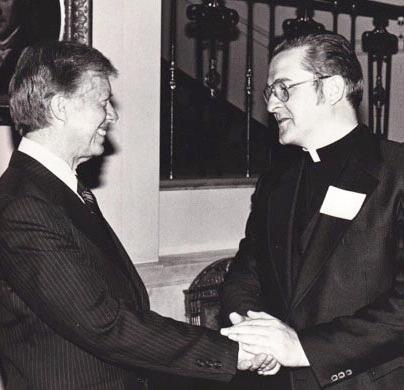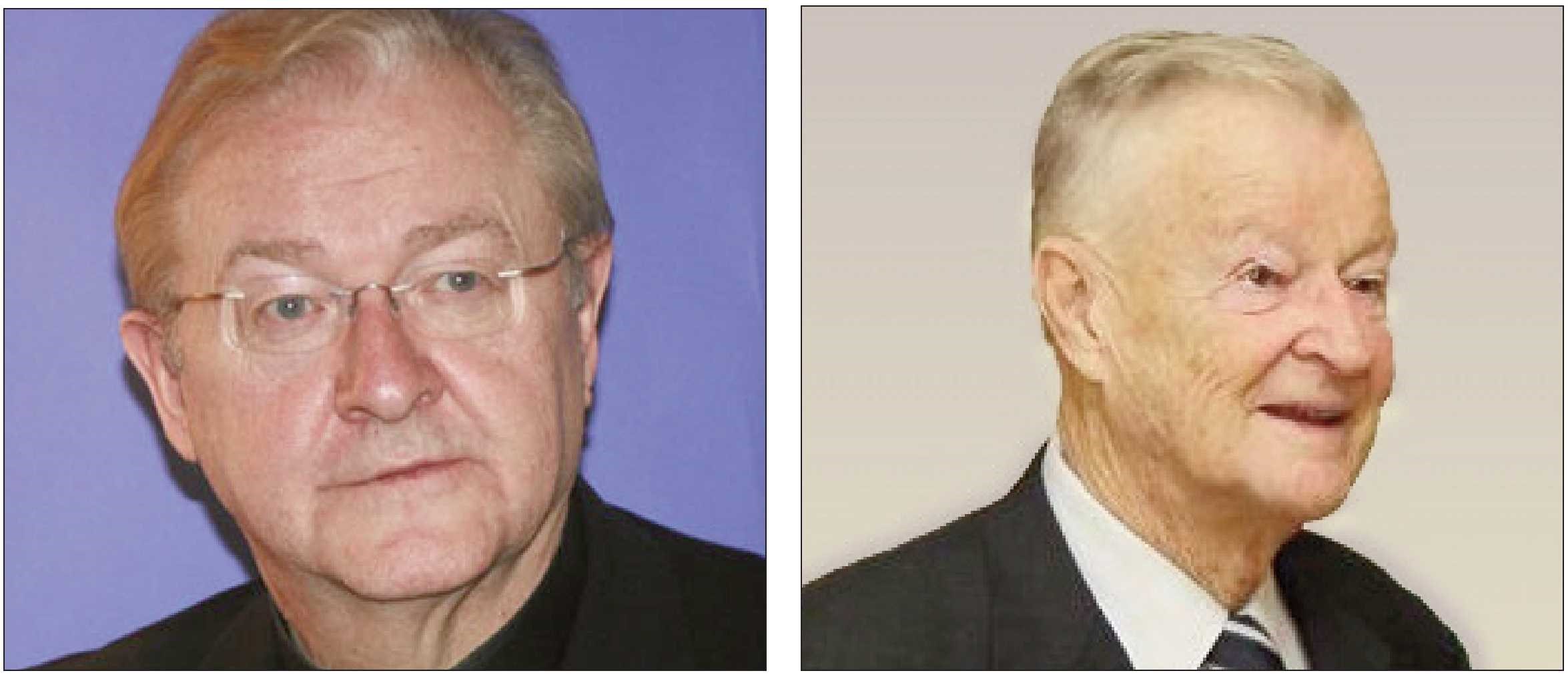Telegram reveals British fury over Mc Manus invite
Posted By: May 24, 2017
Echo News
Telegram reveals British fury over Mc Manus invite

President Jimmy Carter with Fr. Sean Mc Manus
By Ray O’Hanlon
September 11-17, 2013
But Fr. Sean McManus was viewed by London as being little more than a terrorist during his early years as founder and president of the Washington, D.C.-based Irish National Caucus.He has campaigned for fair employment and human rights in Northern Ireland and beyond; he has penned books, non-fiction and fiction; and now he is on a committee that chooses winners of an international peace prize.
This is confirmed by the contents of a “confidential” telegram dating back to 1980 and written by a top British diplomat.
Dated April 21, 1980, the telegram was written by then British ambassador to the United States, the late Sir Nicholas Henderson.
The telegram was disseminated to “Dublin, Belfast and British Information, New York.”
A hand written “Prime Minister” on the document would appear to indicate that it was also sent to then British Prime Minister, Margaret Thatcher.
The two-page typed telegram, a copy of which was recently obtained by the INC, complains that the Fermanagh- born Fr. McManus had been invited to the White House on April 11 to meet with President Jimmy Carter.
The INC was present at the meeting, featuring representatives of about 150 fraternal and ethnic organizations and which included an address on international affairs by President Carter’s National Security Advisor, Zbigniew Brzezinski.
Ambassador Henderson outlines in the communication that he had attempted to have Mc- Manus blocked from attending the meeting.
He states that upon learning that Fr. McManus was invited, the matter had been “immediately” taken up with the U.S.
State Department, first at the department level and subsequently with a high-ranking official at State.
Henderson wrote that he had made it clear that the British embassy and government were “seriously concerned” that McManus, “a self-confessed supporter” of the PIRA (Provisional IRA) should be invited to the White House “and given the opportunity to claim officials recognition for the aims of his organization.”
Henderson wrote that the contacted official had said that the State Department had not known of the invitation until “we raised it with them.”
“Henderson went on to say Mat McManus did attend the White House meeting while stating, in parenthesis, “the first time he has met the president since Carter’s unfortunate remarks on Northern Ireland during the 1976 election campaign.”
The official had undertaken to ensure that Brzezinski “was adequately briefed” but Henderson added that the official had said that he could do nothing to have the invitation rescinded at that late stage.
Henderson went on to say that McManus did attend the White House meeting while stating, in parenthesis, “the first time he has met the president since Carter’s unfortunate remarks on Northern Ireland during the 1976 election campaign.”
Henderson continued: “Like others present, he was photographed with the president and subsequently raised the question of human rights in Northern Ireland with Brzezin- ski.
“Brzesinski told McManus that the British and US authorities had the same view of terrorism but, from another account we have received, it seems that Brzezinski may have been rather more equivocal.”
Henderson states that “it is intolerable that the President of the United States should invite to the White House a representative of an organization which supports the Provisional IRA and which is overtly hostile to the British Government. The Irish Ambassador, who was away at the time, also takes a very serious view, and intends to complain.”
Ambassador Henderson subsequently met with Mr. Brzezinski and in the encounter, he had “protested most strongly to him about what had happened.”
Henderson wrote that Brzezinski replied that he did not know who Father McManus was, nor that he had been at the White House briefing.
“When I told him about the links between the Irish National Caucus and the supply of arms to the IRA and that it was as bad for McManus to be received at the White House as it would be if the British Prime Minister received one of the Iranian terrorists at Number 10, Brzezinski entirely agreed. Someone else must have done the inviting. He would send a note about it.
“I asked him if he could give me an assurance that McManus would not be invited to the White House again. He said he could do that three years out of four, but I would understand the politics involved. I said it was more than politics. It was intolerable for the President to be entertaining a terrorist of this kind. Brzezinski again said that he entirely agreed.”
Thirty-three years on, Fr. McManus said that if it was true that a man could be judged by the enemies he made, then he was proud to be seen as an enemy at the time by Ambassador Henderson.
“Isn’t it ironic that at the very same time the IRA and Sinn Fein were also attacking me, and trying to put the Irish National Caucus out of business,” he said.

Fr. Sean Mc Manus Zbigniew Brzezinski










